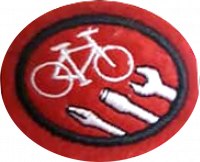Bicycle Maintenance
Skill Level
1
Year
2012
Version
16.11.2024
Approval authority
South American Division
1
Explain the type of bicycle needed for each situation:
1a
Urban area
1b
Paved road
1c
Dirt road
2
Identify and explain the function of each of the following parts:
2a
Frame
2b
Wheel
2c
Fork
2d
Handlebar
2e
Seat
2f
Chain
2g
Brake
2h
Tire
2i
Front derailleur
2j
Rear derailleur
2k
Cassette
2l
Rim
2m
Stainless Steel Flexible V-brake Cable
2n
Hand Brake
2o
Suspension Fork
2p
Handle Grips
2q
Sprocket
2r
Central Bracket Axle
2s
Pedal
2t
Crankset
2u
Chainring
2v
Gearbox
2w
Spokes
2x
Seatpost
2y
Shock Absorbers
3
Identify and change the brake pads and differentiate each brake model:
3a
Tire
3b
Coaster
3c
Disc
4
What is the importance of keeping the brake cables lubricated and adjusted?
5
Install a gear system on a bicycle, or disassemble, lubricate and adjust one you already have. Then explain the reason for the lubrication and adjustment.
6
Identify three different types of rims and explain the differences and qualities for each type of bicycle and terrain.
7
Place the spokes in the rim and align them correctly.
8
Demonstrate how to find holes in the inner tube. Patch them by showing the proper equipment to perform this service.
{ansreq|page=AY Honors/Bicycle Maintenance|num=9}}
10
What type of oil should be used in chains, discs and sprockets?
11
There are two types of pedals, sprocket and sprocketless. Explain and demonstrate the differences, how to change them, how to lubricate them and how to care for each one.
<
12
How is the fork attached to the handlebar? Demonstrate the different types of handlebars and forks.
13
Know the size of the bicycle and the proper height of the seat and handlebar for each person.
14
Intern in a bicycle shop for at least 15 days and give a report of what happened during your time there.



